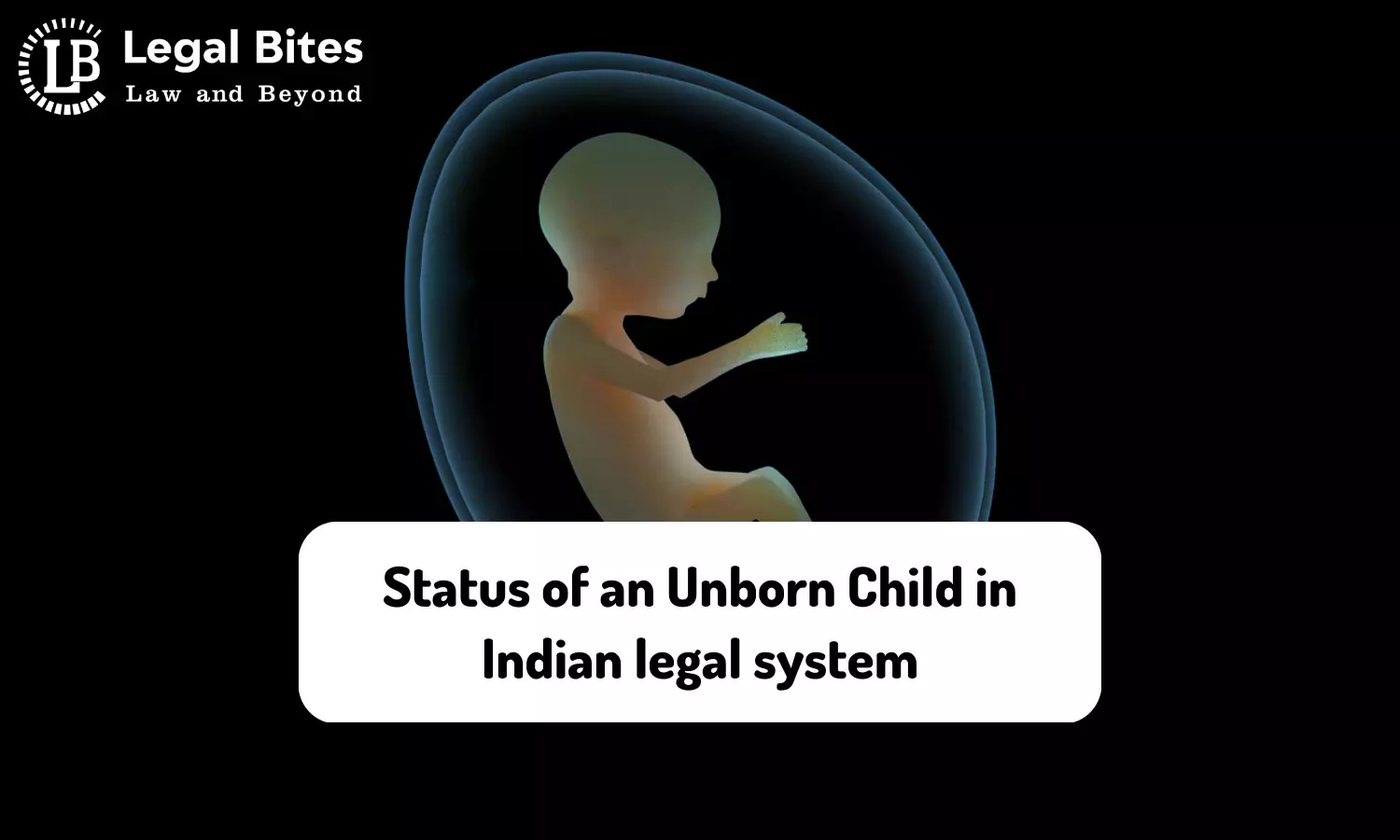Status of an Unborn Child in the Indian Legal System
The article 'status of an unborn child in the Indian legal system' analyses various Indian legislation dealing with the issues relating to the unborn child.

The article 'status of an unborn child in the Indian legal system' analyses various Indian legislation dealing with the issues relating to the unborn child. The author describes foreign legislation dealing with the unborn child and a few case laws dealing with the unborn status in legal issues.IntroductionUnder Indian Constitution, the right to life is a crucial and extensive matter. It protects both the developing children and the unborn child in the mother's womb under the law. There...
The article 'status of an unborn child in the Indian legal system' analyses various Indian legislation dealing with the issues relating to the unborn child. The author describes foreign legislation dealing with the unborn child and a few case laws dealing with the unborn status in legal issues.
Introduction
Under Indian Constitution, the right to life is a crucial and extensive matter. It protects both the developing children and the unborn child in the mother's womb under the law. There are numerous laws in India that were developed specifically for women and children, and also there are laws that provide children with extra advantages. At the national and international levels, there has been debate over the legal rights of an unborn foetus. It is essential to consider whether a foetus can be accorded personhood and human status from the moment of conception.
Rights of an unborn child
Indian Penal Code
Sections 312 and 318 of the Indian Penal Code of 1860 deal with the rights of the unborn, including the right to life, protection of the unborn against injury, concealment of birth etc. The offences against the unborn and their penal protection have been given under these sections.
The child's developmental level determines the severity of the miscarriage offence. If the mother recently becomes pregnant, a low penalty will be granted. If the pregnancy is advanced, this offence is punishable by extremely harsh penalties, up to and including life in jail, but if it is done in good faith, it is not a crime. This offence is non-bailable, cognizable, and non-compoundable as per Section 313.
The laws governing offences involving causing harm to an unborn child are found in Sections 315 and 316. If the mother dies as a result of the alleged act, the accused will be charged with culpable murder, which carries a harsh 10-year prison sentence. The infant must be dead after the act of disposing of the body in secret for Section 318 to apply. It is a serious criminal offence that is both bailable and compoundable.
Hindu Succession Act
The rights of an unborn who is inside the mother's womb are covered under Section 20 of the Act. The rights to an unborn child's property are handled in such a way that a child who was in the womb at the time of the person's death who wants to transfer the property and who is thus conceived alive may have an identical right to acquire from a child who had been conceived before the person's passing, and the legacy should be considered to vest in such a situation with effect from the date of the demise of the person who wants to exchange the property.
Transfer of Property Act
Section 13 of the Transfer of Property Act states that making a prior interest in the property, in the name of the infant or unborn, can be transferred. The child is legally capable of receiving the property even if they may not physically be there. It is crucial to note that a child cannot exercise any other rights on the property until after birth.
The Code of Criminal Procedure
Section 416 of the Code of Criminal Procedure states that if a woman receiving the death penalty is discovered to be pregnant, the High Court shall order a stay of execution and may, if it deems it appropriate, commute the sentence to life in prison.
The unborn child is treated as a normal human being and entitled to the “Right to life” that a normal Human Being deserves under Article 21 of the Indian constitution. The “Right to Life” applies to normal infants and unborn children, regardless of the child's caste, creed, sex, or nationality. Thus, the legislation has to explicitly specify that an unborn should be accorded article 21 and that he or she should not be treated differently from a regular human being for any reason.
Medical Termination of Pregnancy Act
Abortion has been permitted in India under various restrictions since the passage of the Medical Termination of Pregnancy (MTP) Act in 1971. The law was changed in 2003 to give women the ability to access safe and authorised abortion procedures. The MTP Amendment Act of 2021, which extended the gestational restriction to 24 weeks for some groups of women and mandated the opinion of one provider up to 20 weeks of pregnancy, received the go-ahead in 2021.
It allowed all women to access secure abortion services on the grounds of contraceptive failure. According to the Act, introduced on September 24, 2021, abortions can now be done up to 24 weeks into a pregnancy. If the pregnancy is under 12 weeks, only Registered Medical Practitioner must agree that the requirements for an abortion have been met. Nonetheless, two registered medical professionals must agree that the requirements for an abortion have been met if the pregnancy is over 12 weeks but less than 20 weeks.
In the recent judgment, the court dismissed the plea where the petition seeking termination of a 31-week pregnancy. The court observed that there is no justification for treating an unborn child differently from a child who has already been born because the unborn has life from the point at which it develops into a foetus. The following observation has been made by Justice P.B Suresh Kumar in the case of Indulekha Sreejith v. Union of India and Ors., (2021)
"An unborn child has a life of its own and rights of its own and the rights of the unborn are recognised by law. No doubt, only if the unborn can be treated as a person, the right to life of the unborn can be equated with the fundamental right of the mother guaranteed under Article 21 of the Constitution."
Status of an unborn child in Foreign Jurisdictions
The American legal system views the foetus as an integral component of the woman carrying it and does not accord it any rights as a separate being from her. The rights of the foetus, historically held by those who view the unborn child as different from the woman carrying it, have been recognised by the courts, with potentially grave repercussions for the expectant mother. The community's desire for how the legal system should see the foetus must be influenced by a particular appraisal of all possible outcomes.
The Roe v. Wade decision, which established the right to an abortion, was a historic decision by the U.S. Supreme Court. In 1973, the court acknowledged that it is up to the person, not the state, to decide whether to keep or end a pregnancy. The right to an abortion before foetal viability is regarded as being covered by the particular “liberty” clause in the Fourteenth Amendment of the United States Constitution, which safeguards individual privacy.
The Supreme Court has frequently emphasised that the Constitution safeguards the right to an abortion as an essential liberty, i.e. linked to other liberty rights to make private choices regarding one's family, intimate relationships, and bodily autonomy. But the U.S. Supreme Court abandoned its responsibility to uphold fundamental rights in June 2022 and overturned Roe v. Wade, (1973) concluding that there is no constitutional right to abortion. This decision has severe effects that will last for centuries.
In the case of Dobbs v. Jackson Women's Health Organization, (2022) the Supreme Court removed a basic right for the first time, overturning over 50 years of precedent. The Court ruling has expected to prompt the immediate action of half of the states in the United States to outright outlaw abortion, requiring people to travel great distances to get abortion treatment or to carry pregnancies against their will, a terrible violation of their human rights.
In UK, a foetus is not a legal person under English law until it is born. According to the Offenses Against Persons Act of 1861, abortion or termination of pregnancy was a common-law crime in the United Kingdom but was rarely prosecuted (OAPA, Sections 58 and 59). The Special Newborn Life Support Act of 1929 made it illegal to "can be born alive" but to kill or destroy a child who had not yet developed into an independent being apart from the mother's body. It does not cause miscarriage or the killing, manslaughter, or infanticide that may take place during childbirth.
Conclusion
The right of the Unborn has been a matter of dispute for a long time and needs earnest attention in the Indian legal system as well as in the foreign legal system. There are undefined positions of the foetus which recognised as a living being regardless of how many days or weeks it has been growing inside its mother. There will always be a debate between the right of women and the rights of the unborn, as we have seen in the landmark judgement of Roe v. Wade. From the international perceptive, its shows that the rights of women are more well-established than the rights of the unborn. Interventions made on behalf of future individuals may not infringe upon the rights of the person already alive, especially the pregnant lady whose womb the gestation takes place.
Unborn rights are subordinate to those of the born. The protection of a foetus is governed by several statutes and laws in India. But greater clarity and stricter legislation will aid society in its fight against unjustified and illegal abortions. This legislation will also clarify whether or not an unborn child can recognise as a legitimate living being with the same rights and advantages as a born child.
References
[1] Legal Status of Unborn Children in India, Available Here
[2] Mayank Bansal, Rights of Unborn Child In India, Available Here
[3] Vartika Shukla, Rights of an Unborn Child with refine to Article 21 of the Indian Constitution, Available Here
[4] Indulekha Sreejith v. Union of India and Ors., WP (C) No. 17036 of 2021
[5] Hannah M Varghese, An Unborn Child has a life of its own: Kerala High Court Dismiss Plea Seeling Termination of 31 Week Pregnancy, Available Here
[6] Roe v. Wade, 410 U.S. 113 (1973)
[7] Dobbs v. Jackson Women's Health Organization, 2022 WL 2276808, 2022 U.S. LEXIS 3057
Important Links
Law Library: Notes and Study Material for LLB, LLM, Judiciary, and Entrance Exams

Tanmay Mehra
Tanmay Mehra is a law graduate with a Bachelor's in Business Administration and Law (B.B.A.LL.B.) from National Law University Odisha, Cuttack. Currently, she is aspiring to crack the Judicial Service examination.
